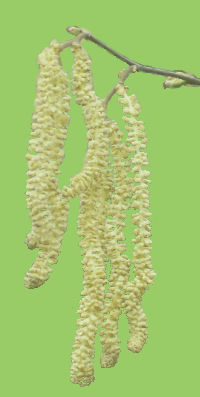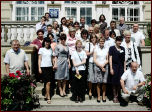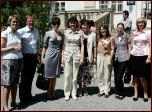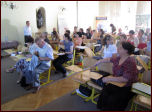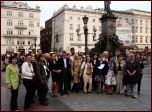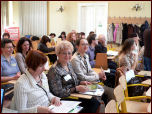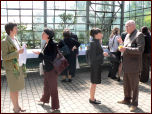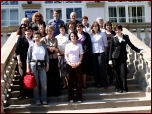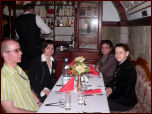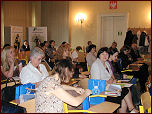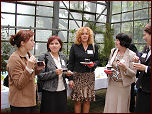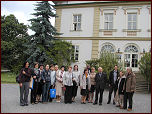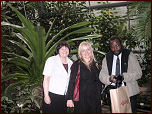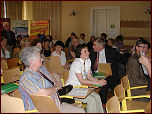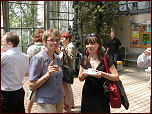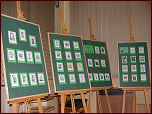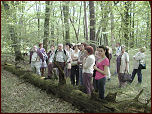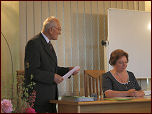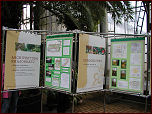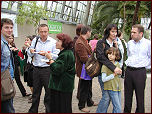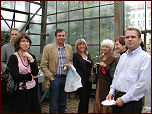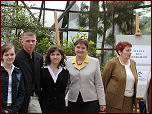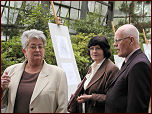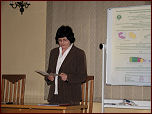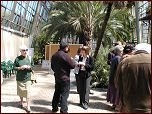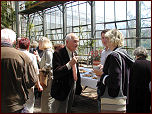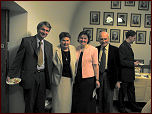

XIV DAYS OF POLLEN ALLERGY IN KRAKOW
18 - 19 May 2018
History
2011

The Conference “XIII Days of Pollen Allergy” was held on 27-28 May 2011. Apart from the participants from the different Polish Universities, the guests from Ukraine and Switzerland have attended the Conference. Our guest, invited by the authorities of Medical College was dr Bernard Clot from the University in Neuchatel, Switzerland. Dr Clot is also the vice-president of the International Aerobiology Association.
The reports were focused on pollen concentration of plants most often provoking pollen allergy in Poland and in Ukraine and their relationship with meteorological conditions. The previous results of the distribution of genetically modified triticale pollen were presented by the scientists from the Plant Breeding and Acclimatization Institute (IHAR) – National Research Institute.
The medical session referred to grass allergen analysis in the air of Poznań presented within the European Hialine Project, the problems in venom allergy diagnostics, the practical application of the latest tests in allergic rhinitis diagnostics and also the threat of pollen asthma.
The participants took part in the guided tour in the Underground Museum and social event at the Jarema Restaurant. The Conference provided also an opportunity for aerobiologists to attend the meeting of the Aerobiological Section of the Polish Botanical Society and the Polish Aerobiological Network. On the 26th of may the organizing meeting associated to the 5th European Symposium on Aerobiology was arranged.
2010
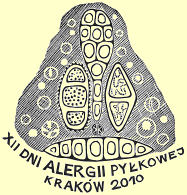
The Conference “XII Days of Pollen Allergy” was held on 28-29 May 2010. Apart from the participants from the different Polish Universities, the guests from Ukraine and Slovakia have attended the Conference.
The reports focused on pollen concentration of plants most often provoking pollen allergy in Poland: alder, hazel, birch, mugwort and grass and their relationship with meteorological conditions. The preliminary study on molecular detection of Alternaria using specific starters against a gene fragment responsible for creation of allergenic protein Alt a1 was performed. The medical session referred to grass allergen analysis in the air of Poznań presented within the European Hialine Project, palynological and immunological research comparison of pollinosis in west Ukraine; present trends of specific immunotherapy and the diagnostics of allergic rhinitis.
When the sessions were over, the participants took part in the guided tour around the Jewish District of Cracow. The Conference provided also an opportunity for aerobiologists to attend the meeting of the Aerobiological Section of the Polish Botanical Society and to get to know that the Polish Aerobiological Network finally and legally came into being. The participants of the Conference will meet again at the annual meeting: XIII Allergy Days in Cracow on 27-28 May 2011.
2009
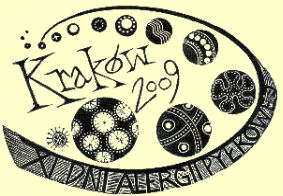
The XI Conference was organized on the 20-30 of May, with a special guest Akinwunmi O. Latunde-Dada from the Rothamsted Research Unit in Hetrfordshire, UK. At the beginning of the Conference the scientific life story of Alicja Stach DSc (1951-2009), one of the most active representatives of the aerobiological community in Poland was reminded.
During the Conference the presentations of pollen monitoring in different regions in Poland and the influence of the meteorological parameters on the pollen concentration dominated. There were also presented the results of the airborne dust monitoring in Krakow and the impact of industrial pollution on the pollen concentrations. The really interesting thing was the practical application of aerobiological monitoring to protect the rape fields against stem canker of brassicas in Poland (SPEC system www.spec.edu.pl).
In the medical session the results of allergen concentration analysis in the air, the advantage of the allergy treatment in the Wieliczka Salt Mine and the pan-allergens as a cross-reactions phenomena were presented. The social program included the Botanical Garden visit and the Conference Dinner in the Jarema restaurant. During the Conference the exlibris exhibition made by Krzysztof Kmieć, DSc was presented.
2008
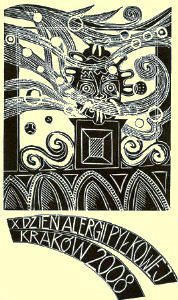
The Conference formula changed into a two day meeting. In 2008 the Conference took place on the 30-31 of May under the Patronage of the Rector of the Jagiellonian University.
The first day was dedicated to pollen and fungal spores monitoring in the air and in the honey. The new subject referring to the importance of aerobiological monitoring in agriculture was introduced by the specialists from the Institute of Plant Genetics Polish Academy of Sciences in Poznań. During the Day of Pollen Allergy the preliminary results of the epidemiological study ECAP performed in Poland were presented. Really interesting were the results of the analysis of palynological samples collected from the face in association with the pollen calendar. Some practical advices for patients suffering from pollen allergy were given by physical doctors.
The social program involved the Niepołomice Castle visit and also some parts of the Niepołomice Forest. In the Conference Room the exlibris exhibition performed by Krzysztof Kmieć DSc was presented.
Additionally, meetings of the Aerobiology Section of the Polish Society of Botany and the Polish Society for Fighting Allergic Diseases took place.
2007

On the 2nd of June Kraków hosted the participants of the IX Pollen Allergy Day. Then the results of the multi-centered studies on mugwort pollens seasons in Poland and the results of the regional research on ragweed pollen concentrations in Kraków, plane tree pollen in Poznań and aeroallergens in Rabka Spa were presented.
Within the methodology used in aerobiology, the progress in the system of the automatic pollen identification was showed, and also the suggestions for the strategy of aerobiological studies. The new problem presented during this conference was to estimate the soil superficial samples with reference to the local pollen rain.
In the medical session the results of mono- and polivalent allergy to pollen allergens in Łódź and the advantage of sublingual immunotherapy were discussed.
2006
On the 20th of May the next palynological-medical meeting was organized in Kraków. The subject of the presentations referred to the pollen monitoring in Rabka, Rzeszów, Kraków, Poznan and Sosnowiec. Methods of pollen grains counting and the relation between the results of pollen monitoring using stationary and individual traps were showed. One of the most interesting presentations was on the allergen release and identification.
The participants had opportunity to visit the Botanical Garden during the conference breaks.
2005
The conference took place on the 21st of May, in the Collegium Sniadeckiego building. The scientific program was divided into two sessions. The results of the monitoring of pollen grains and fungal spores in the air of Rzeszow, Sosnowiec and Kraków and the relationship between pollen concentration and allergy symptoms intensity in sensitive children in Łódź were presented. The problem of oral allergy symptoms (OAS) and the relationship between the concentration of H2O2 in the breath air and the allergen exposure were pointed out to participants.
Delegates invited from Spain (I. Bustos Delgado i J. C. Prieto Buena) have presented the scheme of the Spanish Aerobiological Network (REA) organization and the results of the fungal spores monitoring.
The program for visitors of the Botanical Garden included the stay in the filtered air of a palm house, medical advices and the exhibition of garden house projects.
Sponsorzy:
- IBSS BIOMED S.A.
- HAL Allergy
- MSD
- AstraZeneca Pharma Poland Sp. z o.o.
